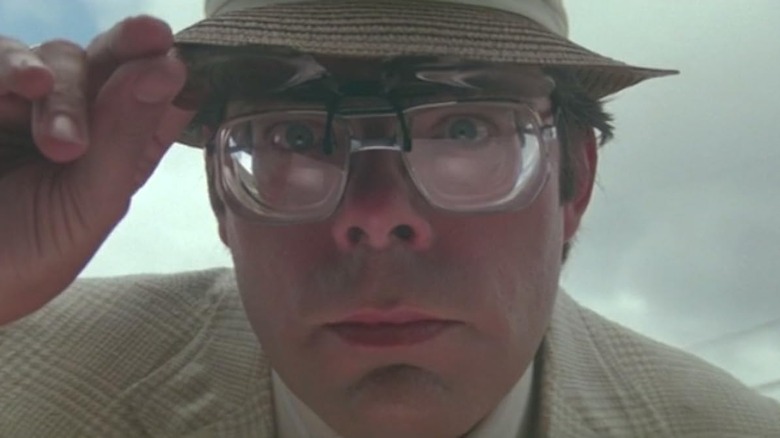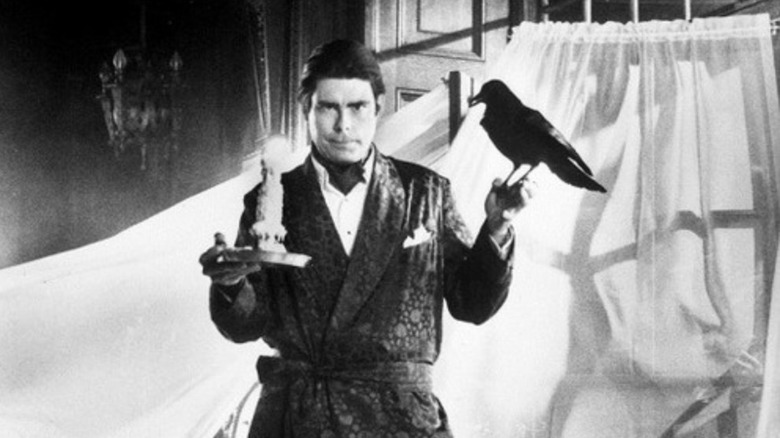Stephen King's Biggest Career Regret Involves A Forgotten TV Commercial
During his long and incredibly prolific career, Stephen King has been involved with a number of things that one could understand he'd either regret and/or would rather forget. One of these regrettable things might be having Stanley Kubrick adapt "The Shining" to the big screen (a personal opinion shared by, as random as it may seem, Clint Eastwood). Another might be the infamous orgy he wrote into one of his magnum opus novels, 1986's "It," a book which continues to be popular even though certain elements — like that moment — have not aged well. Yet another still might be his one and only directing gig on the film "Maximum Overdrive" (1986). While King has proven himself a decent screenwriter a few times over, and has even given a couple memorable turns on screen as an actor, he wasn't very well suited to the director's chair, at least according to the general reception of that movie. While some of us see the charm in "Maximum Overdrive," there's no doubt that its marketing campaign is pretty embarrassing, featuring a trailer where King over promises the movie's scare factor.
Any of those would make for a fairly expected thing that the author and horror icon would have regrets about. Of course, King hasn't lasted this long in the arts and entertainment world for nothing; as evidenced by his erudite, thoughtful interviews over the years (not to mention his work), the man has a very level-headed attitude toward life and especially his work. After all, one does not write upwards of 65 novels by being precious about your output. Instead, King's single regret about his career is an intriguingly obscure one: he wishes he hadn't participated in an ad for American Express during the early 1980s. Although the ad isn't at all embarrassing (watch it here), it's not the spot itself King takes issue with, but rather the effect it had on his quality of life from that point forward.
Stephen King can't leave home without being recognized thanks to American Express
Granted, King revealed this great regret of his during an interview conducted in 2012, so it's possible he's had further musings on the matter since then. Still, the man seems as thoughtful as he is straight-shootin' during the interview, telling The Sunday Times (via The FireWire Blog) about how the AmEx ad allowed Americans to put a face to his already popular name:
"If I had my life over again, I'd have done everything the same. Even the bad bits. But I wouldn't have done the American Express 'Do You Know Me?' TV ad. After that, everyone in America knew what I looked like."
On paper, the ad is relatively harmless, a cute addition to the "Do You Know Me?" campaign which American Express put together around the mid-1970s. Ostensibly, the ads were to feature famous and successful people who weren't immediately recognizable visually, given their status working behind-the-scenes or in otherwise non-front-facing positions. In this way, King's spot is perfect, playing up his importance to the horror genre with some classic Gothic iconography — and while King is no Vincent Price, he acquits himself well. Although King was certainly not shy about making appearances on-screen in movies made by his pals (he has a juicy role in a segment from George A. Romero's 1982 "Creepshow," for starters), it's true that only mega-fans, horror aficionados, and other such insiders would've already known his visage by the time the ad began airing. Afterward, according to King, his recognizability went through the roof, and he had to say farewell to his anonymity.
Although King still wishes he could turn back time and keep his mug out of the American Express ads, it's also possible that without the ads, his star may not have risen as high or remained as long as it has. Not to mention that the ads seem to have influenced at least one loving parody made of them, in the form of the introductions to episodes of "Garth Marenghi's Darkplace." Stephen King may be frustrated that too many of us know what he looks like, but hopefully he can take solace in the fact that we feel honored to have him at all.

